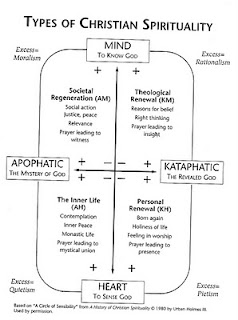question of evil (9)
Whereas Christianity has allowed for the devil to have power and authority in and of himself, the satan only has power granted by God, and has no authority in and of himself"
I remember the whisperings in college when it was suggested that a member of staff did not believe in the person hood of devil. I remember as cadets feeling part of a crusade to correct their erroneous thinking!! I smiled inwardly the other day when a cadet asked me if I believed in The Devil! Of course it might be interesting to work through what Jewish mind in 1 CE Palestine might have made of that question. No doubt Eleanor will help here (not that she is that old of course! :o).What Jews Believe... is a helpful website and resource and I was interested to read that Jews believe in The Satan, and not in the devil (here); that rather than simply a variance in terminology, the the terms are not synonymous, in other words there is a difference between The Satan and the devil.
"For Jews, anything that even remotely conflicts with the idea that God is One and Indivisible will be rejected because it precludes true, pure, monotheism. The idea that there is a God in heaven above who fights against a god of the underworld, or hell, is not monotheism, however, it is the same duality found in other pagan faiths. The Bible speaks of a character known as The Satan, who acts like a prosecuting attorney, or a district attorney, in God's court. However, The Satan has no power or authority in and of himself, rather he must get permission from the Judge, God, to do anything. "The concept and acknowledgement of "the satan." is well versed in scripture and occurs as "HaSaTaN," which means "THE satan", Seemingly the concept of the satan is not the same as the idea of the Devil. 'Whereas Christianity has allowed for the devil to have power and authority in and of himself, the satan only has power granted by God, and has no authority in and of himself'. For the devil, or satan, to have power and authority is to have more than one god, and brings in, what could be, a duality akin to Greek (Zeus/Hades) and Roman (Jupiter/Pluto) thinking. So would the Jewish mind in 1 CE Palestine adhere to the idea of a God in heaven in battle against a god of the underworld? Probably not, in that it 'precludes true, pure, monotheism'.
This runs contrary to those who would dismiss and look down on anyone who would not adhere to a person hood of the devil. NT Wright gets around this, I think, by suggesting that it is wrong to think of the satan as “personal” in the same way that God or Jesus is “personal,” he uses the concept of “subpersonal” in order to refuse the full dignity of person hood and thereby avoids any duality problem.
Perhaps the better question is do you believe in the devil or the satan?

Comments
I am interested in history and theology but have not studied enough to be able to comment.
I would dearly love to know, though, what the twelve disciples would make of the training college, should they have unexpectedly found themselves visiting it?
'The Satan' understood as prosecutor was the teaching I encountered in Judaism.
Ian ;-).
On the other end I do have the feeling that 'evil' is capable of scheming and plotting. How does that work in the light of this discussion?
I guess working out, within this framework, how to keep what Walter Wink calls the 'subtle coincidence of demonic promptings and people's words or thoughts' from becoming a'consistently paranoid view of reality', is a good place to start when looking at satan's schemes!